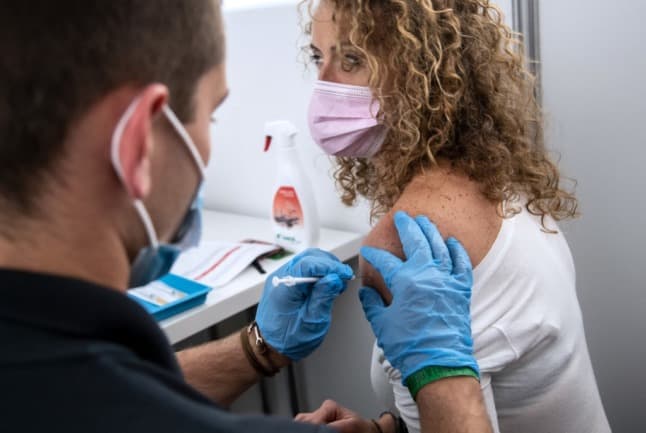Pandemic in Europe won't be over until 70 percent are vaccinated, says WHO

The WHO's European director warned Friday that the Covid-19 pandemic won't end until at least 70 percent of people are vaccinated, and criticised Europe's vaccine rollout as "too slow".
The World Health Organisation's regional director for Europe Hans Kluge said countries and their populations must not become complacent about the pandemic.
"Don't think the Covid-19 pandemic is over," Kluge told AFP in an interview, while adding that vaccination rates needed to increase.
"The pandemic will be over once we reach 70 percent minimum coverage in vaccination," the regional director said.
In the 53 countries and territories that make up the WHO's European region -- including several in Central Asia -- 26 percent of the population has received a first dose of a Covid-19 vaccine.
In the European Union, 36.6 percent of the population has received at least one dose and 16.9 percent have been fully vaccinated, according to a count by AFP.
READ ALSO: COMPARE: How fast are European countries vaccinating against Covid-19?
READ ALSO: UPDATE: What rules do European countries have in place for travel from the UK?
Kluge said one of his main concerns was the increased contagiousness of new variants.
"We know, for example, that the B.1617 (Indian variant) is more transmissible than the B.117 (British variant), which was already more transmissible than the previous strain," Kluge noted.
Cases of the so-called Indian variant have been recorded in 27 of the region's 53 countries, while the number of new cases, and deaths, has fallen for five consecutive weeks, reaching their lowest levels since mid-October.
Speed essential
Worldwide, new cases have dropped for four weeks in a row, according to an AFP tally.
But while vaccines have proven effective against coronavirus mutations, people must still be vigilant, Kluge emphasised.
The Belgian doctor said a major concern was that "people drop their guards, that they become complacent," especially going into the summer months.
In addition, large gatherings are on the horizon in conjunction with the European football championship.
"Let's finally give Covid-19 the red card, don't allow extra time for Covid-19," Kluge quipped, repeating advice to maintain social distances and wear face masks.
He also underscored that speed is "of essence" during the pandemic.
"Our best friend is speed, time is working against us, (and) the vaccination rollout is still going too slowly," Kluge said.
"We need to accelerate, we need to enlarge the number of vaccines," and European countries needed to show more solidarity, he said.
"It is not acceptable that some countries are starting to vaccinate the younger, healthy part of the population, while other countries in our region have still not covered all the health care workers and the most vulnerable people," he added.
Comments (1)
See Also
The World Health Organisation's regional director for Europe Hans Kluge said countries and their populations must not become complacent about the pandemic.
"Don't think the Covid-19 pandemic is over," Kluge told AFP in an interview, while adding that vaccination rates needed to increase.
"The pandemic will be over once we reach 70 percent minimum coverage in vaccination," the regional director said.
In the 53 countries and territories that make up the WHO's European region -- including several in Central Asia -- 26 percent of the population has received a first dose of a Covid-19 vaccine.
In the European Union, 36.6 percent of the population has received at least one dose and 16.9 percent have been fully vaccinated, according to a count by AFP.
READ ALSO: COMPARE: How fast are European countries vaccinating against Covid-19?
READ ALSO: UPDATE: What rules do European countries have in place for travel from the UK?
Kluge said one of his main concerns was the increased contagiousness of new variants.
"We know, for example, that the B.1617 (Indian variant) is more transmissible than the B.117 (British variant), which was already more transmissible than the previous strain," Kluge noted.
Cases of the so-called Indian variant have been recorded in 27 of the region's 53 countries, while the number of new cases, and deaths, has fallen for five consecutive weeks, reaching their lowest levels since mid-October.
Speed essential
Worldwide, new cases have dropped for four weeks in a row, according to an AFP tally.
But while vaccines have proven effective against coronavirus mutations, people must still be vigilant, Kluge emphasised.
The Belgian doctor said a major concern was that "people drop their guards, that they become complacent," especially going into the summer months.
In addition, large gatherings are on the horizon in conjunction with the European football championship.
"Let's finally give Covid-19 the red card, don't allow extra time for Covid-19," Kluge quipped, repeating advice to maintain social distances and wear face masks.
He also underscored that speed is "of essence" during the pandemic.
"Our best friend is speed, time is working against us, (and) the vaccination rollout is still going too slowly," Kluge said.
"We need to accelerate, we need to enlarge the number of vaccines," and European countries needed to show more solidarity, he said.
"It is not acceptable that some countries are starting to vaccinate the younger, healthy part of the population, while other countries in our region have still not covered all the health care workers and the most vulnerable people," he added.
Join the conversation in our comments section below. Share your own views and experience and if you have a question or suggestion for our journalists then email us at [email protected].
Please keep comments civil, constructive and on topic – and make sure to read our terms of use before getting involved.
Please log in here to leave a comment.